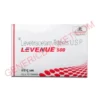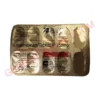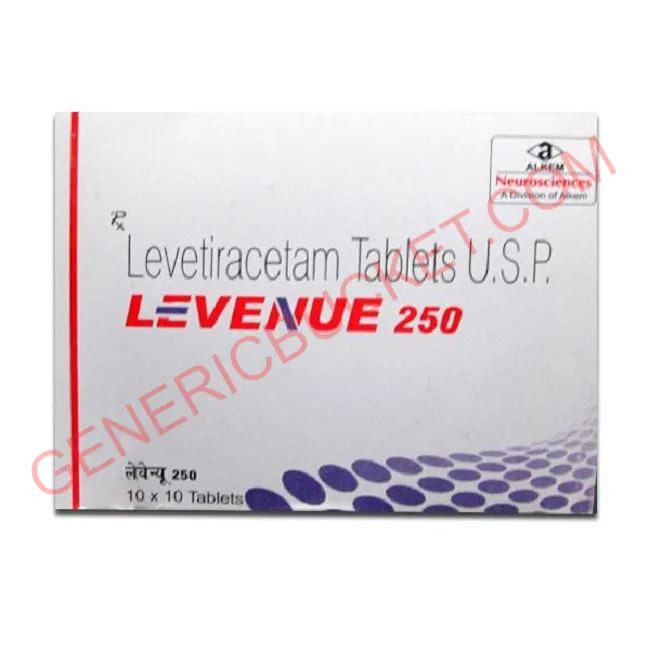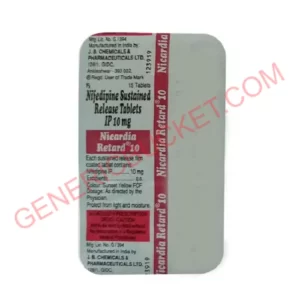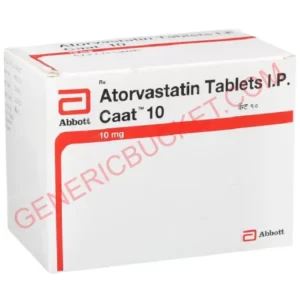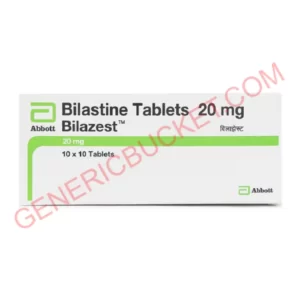Levenue 250 Tablet (Levetiracetam 250mg)
$40.00 – $102.00Price range: $40.00 through $102.00
| Country of Origin | India |
|---|---|
| Dosage Form | tablet |
| Generic Name | Levetiracetam |
| Indication | Epilepsy/Seizures |
| Manufacturer | Alkem Laboratories Ltd |
| Packaging | 10 tablets in 1 strip |
| Composition | Levetiracetam (250mg) |
| Levenue 250 Tablet (Levetiracetam 250mg) | |||
| Pack Size | Price | Price/Unit | Add To Cart |
| 50 Tablet/s | $40.00 (0.8/unit) | $0.8 | |
| 100 Tablet/s | $75.00 (0.75/unit) | $0.75 | |
| 150 Tablet/s | $102.00 (0.68/unit) | $0.68 | |
Levenue 250mg
LEVENUE 250MG TABLET contains Levetiracetam which belongs to the group of medicines called Anticonvulsants. It is used to treat epilepsy (seizures). Epilepsy is a disorder in the central nervous system in which the brain activity becomes abnormal, causing seizures (fits) or unusual sensations, behaviours and sometimes loss of consciousness.
LEVENUE 250MG TABLET is also used in combination with other antiepileptic medicines to treat partial onset seizures with or without generalisation (abnormal activity involving one side of the brain), myoclonic seizures (short, shock-like jerks of a muscle or involving group of muscles), juvenile myoclonic epilepsy (myoclonic seizures in adolescents from 12 years of age), primary generalised tonic-clonic seizures (major fits which includes loss of consciousness), and idiopathic generalised epilepsy (type of epilepsy which is thought to have a genetic cause).
Along with the treatment with LEVENUE 250 MG TABLET, your doctor may suggest you make some lifestyle changes such as healthy eating and sleeping habits, managing stress, and exercising or meditating regularly. Prior to starting the treatment with LEVENUE 250MG TABLET, your doctor might ask you to take some diagnostic tests.
Before taking LEVENUE 250MG TABLET inform your doctor if you have liver, kidney or heart diseases. LEVENUE 250MG TABLET should be used with caution in pregnant women and not recommended for use in breast-feeding women.
LEVENUE 250MG TABLET is not recommended for use in children and adolescents below 16 years of age, however it can be used in combination with other medicines. Consult with your doctor before taking. Some of the serious side effects of LEVENUE 250MG TABLET includes thoughts of self-harming, contact your doctor immediately if you notice symptoms of depression or suicidal thoughts.
The most common side effects of taking LEVENUE 250 MG TABLET are inflammation of nose and throat, sleepiness, dizziness, lethargy, anorexia, depression, anxiety, vertigo, cough, nausea. Contact your doctor if you experience these above side effects or worsen.
USES OF LEVENUE 250 MG TABLET
- Treats epilepsy (seizures)
HOW LEVENUE 250 MG TABLET WORKS
LEVENUE 250MG TABLET acts on the brain and modify the release of certain nerve chemicals. Brain cells communicate with each other using electrical signals and chemicals. When there is any disturbance in this communication, seizure (fits) happens. Levetiracetam combines with a protein (SV2A) present in central nervous system and inhibits the release of abnormal nerve chemicals (neurotransmitters). This does not affect the normal brain communication.
DIRECTIONS FOR USE
Take LEVENUE 250 MG TABLET as advised by your physician. Swallow the medicine with a glass of water. Do not crush or chew the medicine.
Your doctor will decide the correct dose and duration for you depending upon your age, body weight and disease condition.
SIDE EFFECTS OF LEVENUE 250 MG TABLET
COMMON
- Inflammation of nose and throat (nasopharyngitis)
- Somnolence (excessive sleepiness)
- Headache
- Loss of appetite
- Depression, aggression, anxiety
- Insomnia, nervousness, irritability
- Convulsion, balance disorder
- Dizziness
- Lethargy, tiredness
- Tremor (involuntary trembling)
- Vertigo (sensation of rotation or spinning)
- Cough
- Abdominal pain
- Diarrhoea, indigestion
- Vomiting, nausea
- Rash
UNCOMMON
- Decreased number of blood platelets (easy bruising, more bleeding, bleeding from gums or nose)
- Decreased number of white blood cells (chills, fever, body ache, headache)
- Weight decrease or increase
- Panic attack, emotional instability, mood swings
- Loss of memory, forgetfulness, abnormal or impaired coordination
- Paraesthesia (tingling)
- Disturbance in attention (loss of concentration)
- Double vision, vision blurred
- Hair loss, eczema
- Muscle weakness, muscle pain
RARE
- Infection
- Decreased blood sodium concentration
- Delirium
- Seizures may become worse or happen frequently
- Uncontrollable muscle spasms affecting the head, body and limbs
- Difficulty in controlling movements, hyperactivity
- Change of the heart rhythm (Electrocardiogram)
- Pancreatitis
- Liver failure, hepatitis (abdominal pain, dark urine, itching, light coloured stools, jaundice, swelling of the abdomen)
- Rhabdomyolysis (breakdown of muscle tissue)
- Limp or difficulty in walking
- Fever, unstable blood pressure and heart rate, muscle stiffness, low level of consciousness, confusion (signs of a disorder called neuroleptic malignant syndrome)
Stop taking LEVENUE 250MG TABLET and inform your doctor immediately if you experience any of the following side effects:
- Signs of anaphylactic reaction (weakness, light-headedness, dizziness or have difficulty breathing)
- Signs of Quincke’s oedema (swelling of the face, lips, tongue and throat)
- Signs of Drug Reaction with Eosinophilia and Systemic Symptoms (flu-like symptoms, rash on the face followed by an extended rash with a high temperature, enlarged lymph nodes)
- Signs of sudden decrease of kidney function (low urine volume, tiredness, nausea, vomiting, confusion and swelling in the legs, ankles or feet)
- Signs of erythema multiforme (skin rash which may form blisters and look like small targets like central dark spots surrounded by a paler area, with a dark ring around the edge)
- Signs of Stevens-Johnson syndrome (widespread rash particularly around the mouth, nose, eyes and genitals, with blisters and peeling skin)
- Signs of toxic epidermal necrolysis (severe form of rash causing skin peeling in more than 30% of the body surface)
- Signs of serious mental changes that can be symptoms of encephalopathy (confusion, sleepiness, loss of memory, forgetfulness, abnormal behaviour, involuntary or uncontrolled movements)
- Abnormal thoughts, feeling irritable or reacting more aggressively
- Aggravation (worsening) of epilepsy
HOW TO MANAGE SIDE EFFECTS
Nausea or Vomiting:
Take LEVENUE 250MG TABLET medicine with, or just after meals. Stick to simple meals. Avoid eating rich or spicy food. Ask for your doctor’s advice if nausea doesn’t improve.
Diarrhoea:
Drink a lot of fluids, such as water, fruit juice, to keep yourself hydrated. Do not consume any medicine by yourself without consulting your doctor. Ask for your doctor’s advice if diarrhea persists for a long time.
Stomach pain:
Try to rest and relax. Eat and drink slow or try to have smaller and frequent meals. Keep a heat pad on your stomach. Ask for your doctor’s advice if stomach pain doesn’t improve.
Headache:
Try to take rest and do not involve yourself in exertive activities. You can apply a pain-relieving balm on your forehead. Your doctor might suggest you some painkillers. Ask for your doctor’s advice if headache doesn’t improve.
WARNING & PRECAUTIONS
PREGNANCY
LEVENUE 250MG TABLET should be used with caution in pregnant women only if considered clearly necessary by the doctor. Consult your doctor before taking LEVENUE 250MG TABLET.
BREASTFEEDING
LEVENUE 250MG TABLET is not recommended for use in breastfeeding women. Consult your doctor before taking the medicine.
DRIVING AND USING MACHINES
Do not drive or operate any machines if you feel sleepy after taking LEVENUE 250MG TABLET.
ALCOHOL
Avoid the consumption of alcohol while taking LEVENUE 250MG TABLET.
KIDNEY
LEVENUE 250MG TABLET should be used with caution in patients with kidney disease. Consult with your doctor before taking the medicine.
ALLERGY
Do not take LEVENUE 250MG TABLET if you are allergic to Levetiracetam or to any other ingredients of this medicine.
HEART DISEASE
LEVENUE 250MG TABLET should be used with caution in patients with heart diseases such as family or medical history of irregular heart rhythm (visible on an electrocardiogram), or if you are prone to heartbeat irregularities. Consult your doctor before taking LEVENUE 250MG TABLET.
OTHERS
Before taking LEVENUE 250MG TABLET tell your doctor if you:
- Have salt imbalances
Use in pediatrics:
LEVENUE 250MG TABLET is not recommended for use in children and adolescents under 16 years of age if used alone. However, LEVENUE 250MG TABLET can be used in children and adolescents in combination with other medicines. Your doctor will prescribe the right dose depends on your child’s age, body weight and disease condition.
Use in geriatrics:
Your doctor will decide the correct dose and duration of the treatment depending upon your age, disease condition and body weight. Consult your doctor before taking LEVENUE 250MG TABLET.
INTERACTIONS
A. Drug–Drug Interactions:
Inform your physician if you are taking any of the following medicines before taking LEVENUE 250MG TABLET:
- Laxative such as macrogol (used to treat constipation)
Overdosage:
If you or anyone else accidentally took extra dose of LEVENUE 250MG TABLET, consult your doctor immediately or visit the nearby hospital. Symptoms of overdosage of LEVENUE 250MG TABLET are sleepiness, aggression, agitation, inhibition of breathing, decrease of alertness and coma.
Related products
Angina Pectoris Anti-Anginals
Angina Pectoris Anti-Anginals
Heart & Blood Pressure
Anti Malarial
Allergy
Gastro Health
Antibiotics

